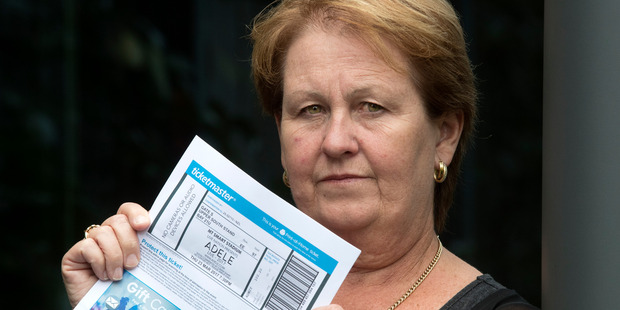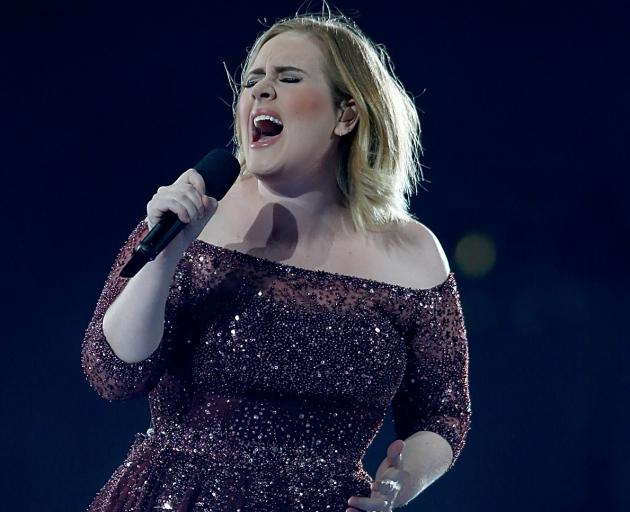
When Deborah Light went looking online for tickets to Adele's shows last month, she thought she'd struck gold.
The 62-year-old snapped up two VIP tickets for $1000.
She selected seats two blocks from the centre stage but was soon in tears when she printed her tickets and saw they were for the Upper South Stand, which cost $99.90 each.
The tickets were intended as a combined Christmas and birthday present from her husband, but instead Light was left heartbroken, out of pocket and without answers.
She thought she was buying from a site which was part of Ticketmaster, the official supplier of Adele tickets.
What she was actually buying from was ticket reseller Viagogo, a heavily criticised business that allows ticketholders to on-sell tickets.
"The fact that they were released on the same day, and you could get the same tickets; the stadium came up, they showed me the tickets that I was going to receive, and I just presumed it was part of Ticketmaster," she told the New Zealand Herald.
She's not alone. Another fan faced potential disaster when her $1361 wheelchair accessible tickets turned out to be regular access tickets, and a couple were turned away at the gates when the tickets they paid $1700 for turned out to be invalid.
Viagogo, the site they all bought from, is under fire in Australia for allegedly selling falsely advertised tickets at over-inflated prices - and it's not the only site facing criticism.

In recent months, Bruce Springsteen fans paid thousands of dollars for his Christchurch show only to be left waiting for their tickets to be sent just a few days before the show, without a word from the site.
J Cole fans saw $90-$110 tickets listed on a similar website, Ticketmaster Resale, for up to $1000, with many claiming tickets had gone up at the same time as - if not before - official sales started.
VIP tickets for Justin Bieber's Purpose tour were sold on Ticketmaster Resale for a staggering $2587 each despite being originally priced at $525.
Now Cat Stevens fans are being warned about Viagogo as tickets appeared there a day after a fan club pre-sale and days before official sales even began.
The New Plymouth District Council released a statement pointing out that general admission tickets were already selling for more than $650 on the site, despite the most expensive official general admission ticket being just $205.70.
It's not just concerts either. The sporting world is dealing with the same issue. Tickets for a highly anticipated heavyweight world title fight between Anthony Joshua and Wladimir Klitschko reached an asking price of $60,000, and two All Blacks Lions tickets were listed for $3220 despite being initially sold for $898.
Australian consumer advocacy group Choice released a damning report this month which, according to News.com.au, "uncovered consistent false claims, dishonest pricing practices and illegal ticket mark-ups by at least two websites targeting Australian consumers".
"In response, the advocacy group has lodged an official complaint with the Australian Competition and Consumer Commission [ACCC] claiming 'misleading and deceptive conduct' by ticket marketplace websites Viagogo and Ticketmaster Resale," the site reported.
According to Choice's report, Viagogo takes about 28% commission and Ticketmaster Resale demands a 21% commission for each resale ticket - a cost that isn't clearly stated during on-site transactions.
When things go sideways with ticket purchases, the only way buyers can contact the websites is via an online email form and, despite "guarantees", many consumers report receiving no response let alone refunds, according to Choice.
Isn't this illegal?
In New Zealand, ticket scalping is not illegal because there is no real way to monitor who is scalping and who has a genuine need to resell.
The only law that could prevent it is the Major Events Management Act of 2007, which requires the Government to declare something a "major event", at which point a prohibition on selling tickets at prices higher than face value is enforced with fines of up to $5000.
However, a concert does not count under the law, and while promoters have the right to apply to the Government to have their event declared a major event, the legislation has applied to international events such as the Rugby and Cricket World Cups.
Promoters regularly issue warnings and reminders to avoid reselling sites, and often undertake measures to try to quash scalping.
Consumer NZ is joining forces with similar groups in Australia and Britain to investigate complaints which it says have been on the rise both here and overseas.
Chief executive Sue Chetwin says they've heard reports of tickets being sold in New Zealand for "up to 20 times their face value" and customers also routinely report being "stung by steep fees on these sites".
The group is inviting anyone who has bought a ticket through a resale site to complete its online survey in order to help identify problems in the ticket resale market and what needs to be done to protect consumers. It can be found at consumer.org.nz.
What do these sites say about it?
A Ticketmaster spokesperson says the secondary market is undoubtedly helpful, but controlling it is an uphill battle.
"Ticketmaster Resale provides a platform for fans to sell unwanted tickets and a safe purchase option for events. Ticketing marketplaces are dynamic and react to demand.
"With high-profile events, tickets are sometimes listed at prices higher than the face value, but they will often be listed at or below face value as well. Ticket holders, not Ticketmaster Resale, control the inventory and the price of the tickets."
They added that despite efforts to control the issue, it's an impossible battle given the nature of the internet, which is why they support legislation changes.
"Ticketmaster invests millions in technology and human moderation to identify and block bot activity, but it's a battle we can't win alone".
"We need stronger up-to-date legislation and greater enforcement, as well as the wider ticketing industry working together, to prevent people who want to deny real fans the opportunity to get tickets."
Viagogo is yet to respond to the Herald requests for comment.
The site, founded in London in 2006 and based in Geneva, calls itself a "global online platform" for tickets which "helps ticket sellers ranging from individuals with a spare ticket to large multinational event organisers reach a global audience".
- By Siena Yates of the New Zealand Herald












